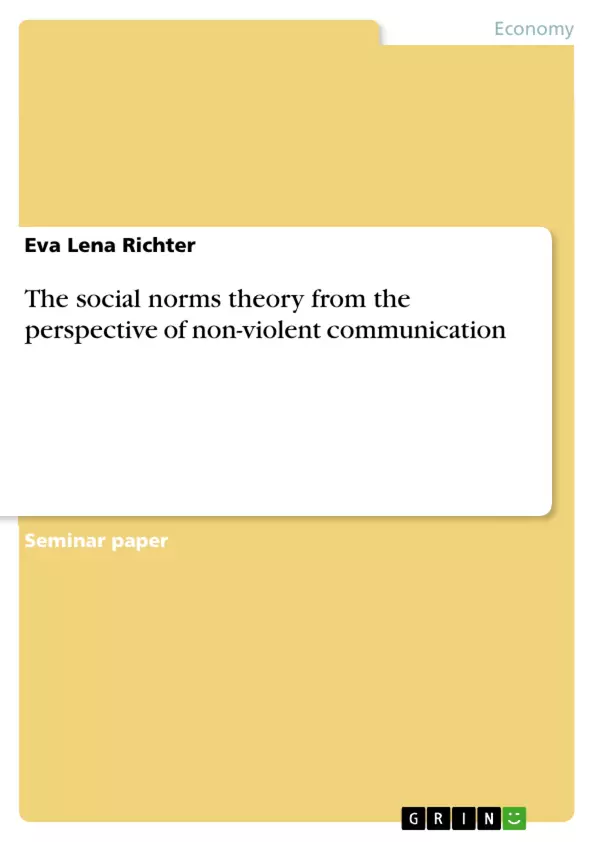The social norms approach has been used as a foundation for various studies mainly around the prevention of youth risk behaviour and encouragement of pro-social behaviour. The approach is seen as a useful tool to explain human behaviour and actively initiate behavioural changes.
This paper sheds light on the social norms approach from a different perspective, namely from the perspective of Non-Violent Communication (NVC). First, the social norms theory (SNT) is presented, referring to the larger framework of the theory and then to the study “The Constructive, Deconstructive and Reconstructive Power of Social Norms” of Wesley Schultz and his colleagues. In chapter 3, the basic assumptions and principles of NVC after Marshall Rosenberg are contoured. In chapter 4, the assumptions of SNT also drawing on the study of Schultz and his colleagues are examined from the perspective of NCV. The conclusion summarizes the findings and points towards implications for ethical culture.
Inhaltsverzeichnis (Table of Contents)
- ABBREVIATIONS
- INTRODUCTION
- SOCIAL NORMS THEORY
- Basic assumptions of social norms theory
- How change happens according to social norms theory
- Behavioural energy efficiency and the study of Schultz et al.
- ROSENBERG'S NON-VIOLENT COMMUNICATION
- Basic assumptions of Non-Violent Communication
- How change happens through Non-Violent Communication
- EXAMINING THE ASSUMPTIONS OF SOCIAL NORMS THEORY WITH NON-VIOLENT COMMUNICATION
- TOWARDS ETHICAL (CORPORATE) CULTURES: PROFIT IS NOT A NEED
- BIBLIOGRAPHY
- APPENDIX
- Examining the role of social norms in shaping individual and collective behavior
- Exploring the relationship between social norms and Non-Violent Communication
- Investigating how social norms influence behavioral change, with a focus on ethical considerations
- Analyzing the implications of the social norms theory for creating ethical (corporate) cultures
- Highlighting the limitations of traditional approaches to norm change and exploring alternative strategies
- Introduction: This chapter introduces the social norms approach and its relevance in studying youth risk behavior and pro-social behavior. It outlines the paper's focus on examining the social norms theory through the lens of Non-Violent Communication (NVC).
- Social Norms Theory: This chapter delves into the core concepts of the social norms theory, defining key terms like empirical and normative expectations. It discusses the role of social norms in shaping practices and the influence of misperceptions on behavior.
- Basic Assumptions of Social Norms Theory: This section explores the fundamental assumptions underlying the social norms theory, including the notion of human action driven by self-interest and the significance of social sanctions. It also presents seven additional assumptions related to misperceptions and the power of information in driving change.
- How Change Happens According to Social Norms Theory: This chapter examines various approaches to changing social norms, emphasizing the limitations of external interventions and the importance of deliberation and communication in fostering collective belief change.
- Behavioural Energy Efficiency and the Study of Schultz et al.: This section introduces the study "The Constructive, Deconstructive and Reconstructive Power of Social Norms" by Schultz and his colleagues, which focuses on behavioral energy efficiency and the influence of social norms on energy consumption.
Zielsetzung und Themenschwerpunkte (Objectives and Key Themes)
This paper analyzes the social norms theory, its assumptions, and its potential for initiating behavioral change, specifically within the framework of Non-Violent Communication (NVC). It aims to understand how the social norms approach can contribute to ethical (corporate) cultures and promote pro-social behaviors, particularly in the context of reducing negative practices.
Zusammenfassung der Kapitel (Chapter Summaries)
Schlüsselwörter (Keywords)
This paper focuses on key concepts such as social norms theory, Non-Violent Communication (NVC), behavioral change, ethical cultures, misperceptions, normative expectations, empirical expectations, and collective action problems. It explores the intersection of these ideas in relation to corporate development and business ethics, drawing insights from empirical research, particularly the study by Schultz et al. on energy efficiency.
Frequently Asked Questions
What is the Social Norms Theory (SNT)?
SNT is an approach used to explain human behavior by analyzing perceived social norms. It is often used to prevent youth risk behavior and encourage pro-social behavior by correcting misperceptions about what others think and do.
How does Non-Violent Communication (NVC) relate to social norms?
This paper examines SNT through the lens of NVC, which was developed by Marshall Rosenberg. It explores how NVC's focus on needs and empathy can offer a different perspective on how social norms influence behavioral change.
What was the focus of the study by Schultz and his colleagues?
The study "The Constructive, Deconstructive and Reconstructive Power of Social Norms" analyzed how social norms influence behavioral energy efficiency and energy consumption patterns.
What are "empirical" and "normative" expectations?
Empirical expectations are what we believe others actually do, while normative expectations are what we believe others think we *should* do. Both play a major role in shaping our practices.
Can profit be considered a "need" in ethical corporate culture?
From an NVC perspective, the paper argues that profit is not a fundamental human need, which has significant implications for building truly ethical corporate cultures.
How does change happen according to Social Norms Theory?
Change occurs when misperceptions are corrected through information, deliberation, and communication, leading to a shift in the collective belief of the group.
- Citar trabajo
- Eva Lena Richter (Autor), 2017, The social norms theory from the perspective of non-violent communication, Múnich, GRIN Verlag, https://www.grin.com/document/387938



